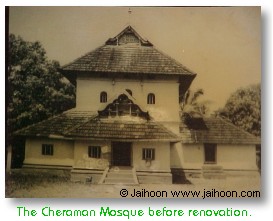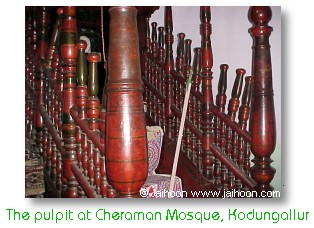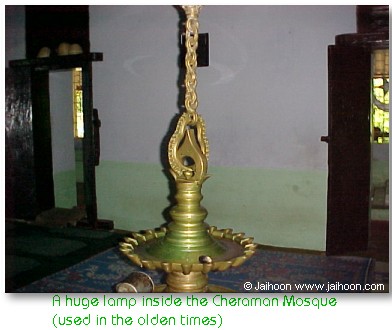The First Indian to accept Islam
Cheraman Perumal, of Kodungallur, Kerala, was the first Indian to accept Islam. Many historians have recorded this fact in their writings. For example, M. Hamidulla writes in “Muhammad Rasoolullah” quoting some old manuscripts from India Office Library (ref no. Arabic, 2807, 152-173)
“There is a very old tradition in Malabar, South-West Coast of India, that Chakrawati Farmas (perhaps another name for denoting Cheraman Perumal) one of their kings, had observed the splitting of the moon, the celebrated miracle of the Holy Prophet at Mecca, and learning on inquiry that there was a prediction of the coming of a Messenger of God from Arabia, he appointed his son as regent and set out to meet him.
* * *

* * *
He embraced Islam at the hand of the Prophet, and when returning home, at the direction of the Prophet, died at the port of Zafar, Yemen, where the tomb of the “Indian king” was piously visited for many centuries.”
The Holy Quran makes the following reference to the miracle of Holy Prophet –
“The Hour is nigh and the moon was cleft asunder”
Thus it is clear that Cheraman Perumal was the first believer of India. However, there are differences of opinion among historians concerning the year in which it took place. (It is not in the scope of MeraWatan to sort out the chronological differences).
Advent of Islam
It is difficult to estimate the exact date when the Indo – Arab relations began. History has it that about 2200 years ago, Arabs used to visit Kerala to sell pepper, sandalwood, elephant horns. It is through Arabs, the Christianity and Judaism reached Kerala first. They had settled long before the arrival of Prophet. As Islam’s glory became established in Arabia, the relation was strengthened day by day. A group of Arabs arrive at Kerala
A group of Arabs set to visit Ceylon (present day Sri Lanka) where it was believed to have the footsteps of Prophet Adam. On the way, they landed at Kerala.
Cheruman Perumal, who was the king of Kodungallur, sent his men to investigate the matter. Sheikh Sahirudhin Ibn Baqiudhin Al Madani, one among the team, replied, “We are Arabs, We are Muslims. We have landed here while on the way to Ceylon”. The king, who’d earlier heard of Islam, became more curious to hear directly from the inhabitants of Madina- the center of Islam. Sahirudhin replied positively to all the questions. The king was overjoyed to learn more about the new faith and converted to it on the spot.
Ahmed Zainudhin Makhdum has mentioned this in his world- renowned masterpiece, Thuhfathul Mujahideen. (Another historic text, Keralolpathi, reports that Perumal left for the pilgrimage at Makkah). Anyway the king kept his conversion a secret and asked the travelers to do the same. He presented many gifts to the travelers and while seeing them off, he told that he would be coming with them while they wee returning back to Arabia.
The king visited each part of his country and introduced many administrative changes whereby he divided each part of his country among his relatives. ‘One among his sons, who arrived late from his visit to Kashi, was left with the land of ‘Kozhi’ and ‘Chullikkad’ which later came to be known as Kozhikode. He was given the power to nominate the Grand Qazi of Kozhikode, give permission for the ships leaving for Makkah and to conduct the Mamanga festival. (refer Keralolpathi).
The journey
The king spent weeks in seclusion. In midst of his quiet life, he set out on the journey along with the Arab travelers who’d promised him earlier. On the way, they stopped by Koylandi and from there to Dharmapatnam where they halted for 3 days.Then they set out to Shehr Muqalla. On reaching there, they set for the Hajj pilgrimage and thereafter returned to Malabar. He aspired to spread the message of Islam. But on the way, he fell sick and breathed his last. His companions left for Malabar with the letter written by the king just before his death

The king visited each part of his country and introduced many administrative changes whereby he divided each part of his country among his relatives. ‘One among his sons, who arrived late from his visit to Kashi, was left with the land of ‘Kozhi’ and ‘Chullikkad’ which later came to be known as Kozhikode. He was given the power to nominate the Grand Qazi of Kozhikode, give permission for the ships leaving for Makkah and to conduct the Mamanga festival. (refer Keralolpathi).

The journey
The king spent weeks in seclusion. In midst of his quiet life, he set out on the journey along with the Arab travelers who’d promised him earlier. On the way, they stopped by Koylandi and from there to Dharmapatnam where they halted for 3 days.
Then they set out to Shehr Muqalla. On reaching there, they set for the Hajj pilgrimage and thereafter returned to Malabar. He aspired to spread the message of Islam. But on the way, he fell sick and breathed his last. His companions left for Malabar with the letter written by the king just before his death.
Perumal in Theyyum Songs

The Perumal story is sung in the Theyyum songs as follows:
‘Perumal who began his journey secretly handed over his Kovilakam (palace) to the Samudiri in Dharmapattanam. His companions were with him. The Prophet used to halt at Jeddah. Perumal went there and embraced Islam and adopted the name Tajudhin.’
The Arakkal records also shows that Perumal left for Makkah and changed his name to Tajudhin after embracing Islam
The practice of receiving Pan from a Muslim woman when the King Samudiri ascends throne and the saying ‘I shall guard the sword (kingship) until my uncle returns from Makkah’ continued until 1890s.
Two facts: Story Untold
Islam spread along the western coast, including Kerala, long before the Muslim invasion of North India.
Islam spread in Kerala either at the time of Prophet or just before his death.
Summarized from Kerala Muslims – History of freedom struggle by KM Bahaudhin
C.V. Kunhiraman
C.V. Kunhiraman describes the story of Cheraman Perumal in ‘Karthikodayam’ as follows:
Cheraman Perumal left for Makkah after embracing Islam. Before leaving, he divided his kingdom among his son-in-laws and relatives at the Thiruvanchikulam Temple (see pic). This happened 1400 years ago.
The Panthalam, Kottarakkara and Kollam dynasties came into being after this.
Perumal presents a gift to the Holy Prophet
A tradition of the Holy Prophet has also been reported from one of the companions, Abu Saeed al Khudri, regarding the arrival of Cheraman Perumal:

“A king from India presented the Messenger of Allah with a bottle of pickle that had ginger in it. The Holy Prophet distributed it among his companions. I also received a piece to eat.” Hakim reports in ‘Al Musthadrak’
Video : The Cheraman Perumal Mosque at Kodungallur
Video : The muezzin ( one who calls to prayer) at Cheraman Perumal Mosque at Kodungallur



15 comments
A chain of decendants who were converted to islam were migrated to Punjab at start of 16th century. Details can be found on following link.
Facebook/Kerala Rajput Association
Regards,
1st of the Muharam wafath Hazrath Tajudheen (r) recordicaly known a sahabi rasool (s) from india .
assalamu alikum.dr.ahmed ilyas, please visit this site you can get all details and original hadees i add scaned copy from the kitab saheehain al mustadrak.by imam alhakim(r) also which hadees kitab you found about roman king..>? please mention . thanks.
direct link hadees. copy and paste http://mohdiqbal.webs.com/apps/photos/photo?photoid=4586821
I searched the hadeeth encyclopaedias in Arabic available on the internet and other sources. I didn’t come by the hadeeth reported by Abu Saeed Al Khudri quoted in your article. Could you please give me the clear sources of this hadeeth?
I could find several ahadeeth reported by al Khudri telling the same story about a Roman king.
assalamu alaikum,
please share the evidence about you post the matter. from where you read it.any islamic book. or any historians wrote. it. please mail me. thanks. mohdiqbal13@gmail.com
mrafivilayil
Posted July 14, 2011 at 2:40 PM ..not cheraman perumal, but ‘palli bana perumal’ converted to islam first.name was tajuddin. cheraman is 2nd king converted 2 islam, named a.rahman al samiri lived in hijra 2nd c. for details call +919746106731.
not cheraman perumal, but ‘palli bana perumal’ converted to islam first.name was tajuddin. cheraman is 2nd king converted 2 islam, named a.rahman al samiri lived in hijra 2nd c. for details call +91974
6106731.
assalamu alaikum,
have you any information about exept cheraman permal people accepted islam from india at the hand of rasool (s.a).?
do give me information about the son of Cheraman Perumal the ancient ruler of kerala part of thamizhakam who embraced christainity and left Kodumgallore. travelled south and reache Kaippattor and was titled as Mammootitil Mappillai
Sir,
I ts a good thing that you have researched about Cheraman Perumal who is actually my grand,grand, grand Father the king who ruled kodungallor, during those periods the muslim people taught my ancestors various kinds of magic arts including black Magics, which was only taught to good hearted persons, but during the passage of time those precious scripts were lost. Cheraman Perumal and his royal memebers of those people with strength of one Lion.
Let Him Rule again……………………..Manu
assalamu alaikum
Sir,i read somewhere that its bana perumal and not cheraman perumal who converted to islam first and malik ibn dinar lived in 9th century. Its bana perumal who saw the splitting of the moon and went to meccah.In some historic books we can see that cheraman perumal lived in 9th century
How come the man who lived in the 9th century saw the splitting of the moon which happened in 7th century??
sir, i’m confused….
Hello, Your article gives a clear picture of early history of Islam in India.
I need to write about various religions in India and culture. Can I use the photograph of the oldest mosque? Alos, can I refer your article?
Thanks
Suresh
finally i found the hadees……..
i read the hadees in saheehain al mustadrak reported by Al Imam Al Hafiz Abi Abdillah AL HAKIM -vol 4 chap 33 kitabul ath’ama page 241
assalamu alaikum,
in the history page about cheraman perumal (tajuddin r.a ) you mentioned one hadees from al mustadrak. please can you explain me which chapter or page you foud that one.
thanks & dua salam,
mohammed iqbal
Alaikum salam wrb
Jazak Allah for your kind remarks.
I am afraid i wouldn’t be able to answer that since I am not a historian myself.
regards
Jaihoon
asslamu alaikum,
i just visited your newly arranged site. also i listern your poems,etc. jazakallah khair. also one request is befor you quoted in your site the below link.
some one asking about the historymeans sridevi’s son embraced islam any proof about the history? he is embraced direct malik bin deenar (r.a)? so have you any proof about the matter please share with me. thanks. with best regards, with dua
mohammed iqbal. abu dhabi.
THE FIRST MUSLIM ROYAL DYNASTY IN MALABAR. There are records to show that Cheraman Perumal ‘s nephew ( his sister, Sri Devi’s son ) embraced Islam through Malik bin Dinar (r.a) at Dharmapattanam and was named Muhammad Ali. He was the first Adiraja of Arakkal Muslim royal dynasty of Kannoor. Arakkal dynasty minted and circulated silver coins in the years Hijrah 122 and 163. This shows the said dynasty was in existence very much earlier than Hijrah 122 and that Islam started spreading its influence in Malabar in the 7th century itself